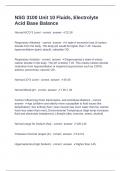NSG 3100 Unit 10 Fluids, Electrolyte
Acid Base Balance
Normal HCO^3 Level - correct answer ✔22-28
Respiratory Alkalosis - correct answer ✔A state if excessive loss of carbon
dioxide from the body. The body pH would be higher than 7.45. Causes
hyperventilation (panic attack), salicylate OD.
Respiratory Acidosis - correct answer ✔(Hypercapnia) a state of exless
carbon dioxide in the body. The pH is below 7.35. This means carbon dioxide
rentention from hypoventilation or impaired lung function such as COPD,
asthma, pneumonia, narcotic OD.
Normal CO^2 Level - correct answer ✔35-45
Normal Blood pH - correct answer ✔7.35-7.45
Factors Influencing Fluid, Electrolytes, and Acid-Base Balance - correct
answer ✔Age (children and elderly more susceptible to fluid issues like
dehydration), Sex & Body Size ( lean muscle has more water than fat, women
have less water than men), Environmental Temperature (high temp increases
fluid and electrolyte imbalances), Lifestyle (diet, exercise, stress, alcohol)
Normal range for Sodium (Na) - correct answer ✔135-145
Potassium Normal ranges (K) - correct answer ✔3.5-5.0
Hypernatremia (High Sodium) - correct answer ✔Higher than 145.
, Causes nausea, vomiting, diarrhea, hyperventilation, fever.
Sings and Symptoms: Dry mouth, thirsty, swollen, tongue, dry mucous
membranes.
Treatment: Restrict sodium and push fluids that are sodium free. (NO COKES
& GIVE LACTATED RINGERS)
Hyponatremia (Low Sodium) - correct answer ✔Lower than 135.
Causes: Fluid intoxication.
Signs & Symptoms: Headaches, seizures, coma.
Treatment: Give sodium via hypertonic solutions (3% NS)
Overload (Overhydration) - correct answer ✔Causes: water intoxication,
tumors, head injuries, medication.
Signs & Symptoms: hypertension, bounding, pulse, distended neck veins,
hyponatremia, polyuria, diluted urine, diluted serum, wet lung sounds
(crackles).
Treatment: Restrict Fluids, diuretics. Measure I & O, weak pulses and assess
hypotension, as muscle, vision, orientation, do DW
What is the sign that patients can have dehydration or overhydration? -
correct answer ✔It is confusion!
Deficit (Dehydration) - correct answer ✔Causes: vomiting, diarrhea, NG tube
to continuous suction, prolonged fever, blood loss, burns, medications
Signs & Symptoms: tachycardia, hypotension, weak thready pulses,
hypernatremia, poor skin turgor, dry mucous membranes, low urine output,
concentrated urine, concentrated serum. Vomiting, diarrhea,headache,
seizures, edema, anorexia, nausea
Treatment: Administer fluids (PO or IV), DW




